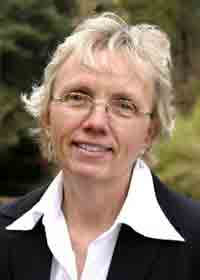
Dr. Ellie Prepas
- B. Math 1971 University of Waterloo
- M. Env. Studies 1974 York University
Major paper entitled: An historical view of the Canadian petroleum industry - Ph.D. 1980 University of Toronto
Thesis entitled: An approach to predicting short-term changes in the phosphorus concentration in lake water
My research program began with a focus on factors (largely internally-driven) that control biomass, production and species assemblages of planktonic and benthic biota in eutrophic lakes and rivers in westernCanada. Identification of these factors allowed me to consider and model processes across broad salinity and nutrient gradients. I was then able to apply this understanding of internal nutrient cycling processes and food chain effects to whole-lake experiments designed to improve water quality, conducted with the cooperation and collaboration of various user groups. The strong link between nutrient conditions and cyanobacterial bloom occurrence and toxin production led me to begin a research program that focused on this emerging issue. Though early work concentrated on within-lake factors, it dovetailed into my more recent focus on the linkage between watershed disturbance and surface water quality, including drinking water supplies. With the recent expansion of industrial activity (forest harvest, primary resource extraction) in the Canadian boreal forest, and the threat of increased fire incidence associated with climate change in western Canada, my focus has broadened to quantifying and modeling processes that link watershed disturbance and climate factors to surface water quality and biota. This has necessitated widening my collaborations and expertise into the areas of riparian vegetation, soils, hydrology, forestry, and modelling. Although my approach continues to be multi-disciplinary and multi-sectoral, I am moving beyond research and experimentation into technology transfer, by developing decision support tools for resource-related industries. Further, whereas my earlier focus was on surface waters in western Canada, I am now pursuing an approach that can be applied to watershed management across the Canadian Boreal Forest. (Click here for current research interests)
Forest Watershed and Riparian Disturbance Project (FORWARD)
Since 2001, the FORWARD Project has collected data on weather, soils, wetlands, vegetation, streamflow, and water quality from first- through fourth-order watersheds on the Boreal Plain of north-central Alberta. Key chemical and physical relationships were established between the watershed and surface waters and pilot deterministic (SWAT) and stochastic (Artificial Neural Networks (ANN)) models were adapted to address small watershed processes. In 2003, a companion project was initiated on the Boreal Shield of northwestern Ontario, within the Dog River-Matawin Forest Management Unit northwest of Thunder Bay. Under identical protocols, the Legacy Forest Small Streams (LFSS) Project conducted baseline monitoring of 10 first- to third-order watersheds from 2004 until 2011, in support of FORWARD’s efforts to move towards a boreal-wide modelling focus and away from regionally centered patterns and processes. In 2006, the Ontario-based LFSS and Alberta-based FORWARD initiatives were amalgamated as FORWARD II. FORWARD II continued the collection of a comprehensive suite of field data to address fundamental questions regarding linkages between natural (e.g., wildfire) and man-made (e.g., forest harvest) disturbance in the boreal forest and various ecosystem components. In addition to expanding our understanding of ecosystem functions in an increasingly distrubed landscape, data were used to adapt, calibrate and validate hydrological and water quality models for direct application by forest managment planners. FORWARD III (2011-2016) will build on the knowledge gained in FORWARD I and II to provide petroleum (specifically oil sands), mining and forestry industries with soil and watershed assessment tools to support cumulative effects management in the Canadian Boreal Forest. (Click here for research photos.)
FORWARD III is a collaborative research project directed through Lakehead University with academic partners at the universities of Alberta, Lethbridge and Saskatchewan and industrial partners in Ontario and Alberta.
Partners of the FORWARD III Project include:
- Natural Sciences and Engineering Research Council of Canada (NSERC)
- Suncor Energy Inc.
- Canadian Natural Resources Ltd.
- Tervita Corporation
- Environment Canada
- Oil Sands Research and Information Network (OSRIN)
- Alberta Newsprint Company
- Alberta-Pacific Forest Industries
- Hinton Pulp
- Millar Western Forest Products Ltd.
- Slave Lake Pulp
- KBM Resources Group
- University of Alberta, Department of Civil and Environmental Engineering
- University of Lethbridge, Biological Sciences
- University of Saskatchewan, Department of Civil and Geological Engineering and Department of Soil Science

